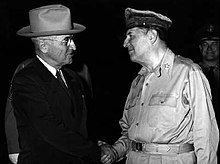
Back Entlassung von General MacArthur durch Präsident Truman German Relevo de Douglas MacArthur Spanish Pelepasan Douglas MacArthur ID Олеснување на Даглас МекАртур Macedonian Отставка генерала Макартура Russian 杜鲁门总统解职道格拉斯·麦克阿瑟 Chinese

On 11 April 1951, U.S. president Harry S. Truman relieved General of the Army Douglas MacArthur of his commands after MacArthur made public statements that contradicted the administration's policies. MacArthur was a popular hero of World War II who was then commander of United Nations Command forces fighting in the Korean War, and his relief remains a controversial topic in the field of civil–military relations.
MacArthur led the Allied forces in the Southwest Pacific during World War II, and after the war was in charge of the occupation of Japan. In the latter role, MacArthur was able to accumulate considerable power over the civil administration of Japan. Eventually, he gained a level of political experience that was unprecedented and yet to be repeated by anyone else actively serving as a flag officer in the U.S. military.
When North Korea invaded South Korea in June 1950, starting the Korean War, MacArthur was designated commander of the United Nations forces defending South Korea. He conceived and executed the amphibious assault at Inchon on 15 September 1950, but when he followed up his victory with a full-scale invasion of North Korea on Truman's orders, China inflicted a series of defeats, compelling him to withdraw from North Korea. By April 1951, the military situation had stabilized, but MacArthur continued to publicly criticize his superiors and attempted to escalate the conflict, leading Truman to relieve MacArthur of his commands. The Armed Services Committee and the Foreign Relations Committee of the U.S. Senate held a joint inquiry into the military situation and the circumstances surrounding MacArthur's relief, and concluded that "the removal of General MacArthur was within the constitutional powers of the President but the circumstances were a shock to national pride".[1]
An apolitical military was an American tradition. The principle of civilian control of the military was also ingrained. Civilian control was an issue considering the constitutional division of powers between the president as commander-in-chief, and Congress with its power to raise armies, maintain a navy, and declare war. This was also an era when the rising complexity of military technology led to the creation of a professional military and American forces were employed overseas in large numbers. In relieving MacArthur for failing to "respect the authority of the President" by privately communicating with Congress, Truman upheld the president's role as preeminent.
- ^ Schnabel 1972, p. 365.
© MMXXIII Rich X Search. We shall prevail. All rights reserved. Rich X Search